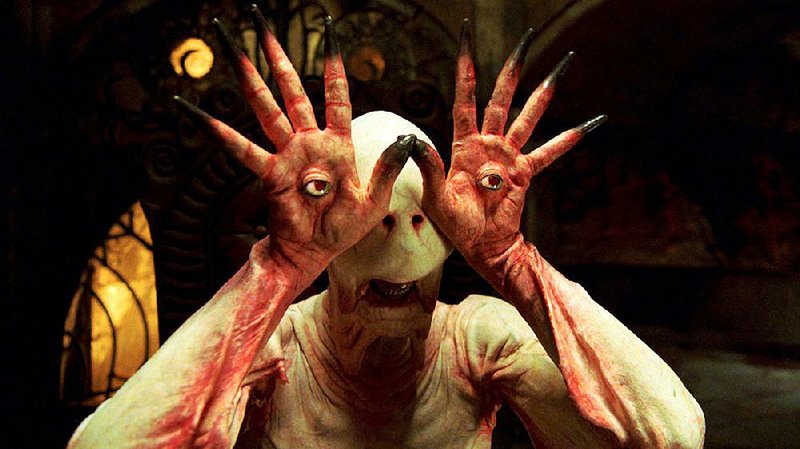Recently, Manohla Dargis and A.O. Scott, film critics for the venerable New York Times, put out a list of what they consider the best 25 films of the 21st century to this point. Last week, I released the latter half of my top 20, this week, the 10 (or so) best films of the millennium. This was not easy, which is a testament to how many excellent films we've been treated to since the turn of the millennium.
10.A Separation (2011)
Continuing in our series of auteurs at the height of their creative powers, we have yet another example with the impeccable Iranian director Asghar Farhadi. This Oscar-winning film displays Farhadi's engrossing methodology -- his films often utilize a central mystery that spirals out, eventually entrapping all of the characters in his carefully plotted conundrums. Here, a husband and wife are split on the idea of taking their young daughter and emigrating abroad: She wants to leave in order to give her child the best chance of success; he feels he needs to stay in order to take care of his aging, unwell father. The two clash, even as another element, in the form of a kindly female caregiver, comes into play, producing a fascinating and complex drama that somehow feels singular in its culture, and universal in its scope. It's difficult to choose the Farhadi entry -- The Past would have been equally worthy -- but let's stick with the one that first brought his work to such international acclaim.
9.A Ghost Story (2017)
This is cheating a bit since the film won't actually open until today, but David Lowery's lyric rumination is so bewitching and deeply affecting, I feel confident in placing it here. It's a difficult film to explain, exactly, but the story involves a young, happily married couple (Casey Affleck and Rooney Mara) on the cusp of moving into a new home. When Affleck's character dies in a car crash just outside their driveway, he wordlessly chooses to stay near his wife in their old place and stays there as a silent ghost in a sheet with dark eyeholes; after she tearfully moves out, however, he is stuck there, forced to bear witness to everything that comes after -- and before -- they occupied that space together. Its non-linearity might be a challenge for some, and it's a film that demands to be taken on its own terms, but I doubt I will see a more moving film this decade.
8.Pan's Labyrinth (2006)
The year this film came out, I was busy working a nonfilm-writing job, starting a family, and doing a million other things that conspired to keep me out of movie theaters. When I finally got a chance to see it on a snowy George Washington's Birthday weekend in New York (along with, among other selections, The Lives of Others, and Children of Men, in an epic binge-watching barrage), I was absolutely floored. Guillermo del Toro has made other strong films (including The Devil's Backbone), but he has never hit the exact sweet spot of strong emotional pathos, terrifying surrealism, and political potency, quite the way he did here. The story of a little girl forced to confront the Evil That Men Do -- in the form of an evil stepfather employing 1944-era fascism -- against a backdrop of a mysterious, often unsettling fantasia, remains a stark marker of who suffers the most in the face of political oppression and cruelty.
7.The Before Series (1995, 2004, 2013)
This breaks all sorts of rules, as it's actually a trilogy (and counting), and the first film in the series (Before Sunrise) actually was released before the turn of millennium, in 1995. Still, Richard Linklater's now-epic examination of a relationship over the course of 20 years -- we first meet Jesse (Ethan Hawke) and Celine (Julie Delpy) as a pair of flirtatious Gen-X pups; then, in Before Sunset, as still searching young adults; and, most recently, in Before Midnight, as a more than slightly jaded married couple, dealing with the failures and disappointments of a fully examined life nevertheless spent half hidden in emotional shadows. As another one of Linklater's grand examinations of time and aging, the trilogy speaks to an entire generation (my own, if no one else's) and perfectly captures the dreams and sagging realities of our lives, and enduring relationships.
6.Two Days, One Night (2014)
The films of the Belgian Dardenne brothers often speak to a point of personal morality, but in particularly obtuse ways. Never have they been as prosaic and emotional than in this, their ninth film. By taking as their protagonist a fragile woman (memorably played by Marion Cotillard), whose shaky sense of self, upon trying to return to work after a breakdown, is only further strained when she finds out her co-workers have voted her out of a job in her absence; they give the audience a sympathetic foil. Given a weekend to meet with her former colleagues to try and change their minds, she is forced, very much against her will, to fight for herself at a time when she feels utterly insignificant, and in so doing, potentially finds the very key to peace for which she has been struggling so unhappily. You certainly wouldn't say it of much of the Dardennes' work, but this film made me optimistic for our collective humanity.
5.The Hunt (2012)
Danish filmmakers Thomas Vinterberg and oft-collaborator Tobias Lindholm have created a sort of artistic cottage industry between them, making Dogme-like films that involve and morally challenge the viewer. Here, in a seemingly simple story of a charismatic kindergarten teacher (Mads Mikkelsen) falsely accused by a vengeful child of predatory wrongdoing, absolutely no one gets out unscathed -- from the parents, whipped up in a terrified frenzy, to the accused, and to the young, would-be victim, who have to live with the consequences of what they've done. It's a testament to the conviction and credibility of the characters that no easy conclusions are able to be drawn, other than to illustrate the corrosive power of fear and distrust. The end of the film, ambiguous to the point where you can argue with your friends and loved ones for hours afterward, only adds to its luster.
4.Manchester By the Sea (2016)
When it splashed out at last year's Sundance, many film critics -- this one included -- felt they had already seen the best film of the year. Kenneth Lonergan's film is essentially a counterargument to the standard Hollywood idea that grief is like any other challenge that one can work through in order to achieve personal growth. The protagonist (Casey Affleck), is devastated by a tremendous personal tragedy and simply can't pull himself out of it, no matter what enticements may lie on the other side. Filled with stunning scenework -- a hallmark of Lonergan, who was a playwright before he became a filmmaker -- and staggering performances, including from the Oscar-winning Affleck, the film is anything but feel-good, but that only makes it all the more powerfully moving.
3.The Act of Killing/The Look of Silence (2012/2014)
At a recent career day at my daughter's school, I was standing before a group of fourth-graders, handling a barrage of questions -- most of which involved either robots, computers, or Spider-Man -- before one precocious child asked me what I would choose as the most important film I had ever seen. After a pause, I answered with this pair of essential docs from Joshua Oppenheimer, who confronts the mass murder of citizens after the 1965 military coup in Indonesia from several significant angles. In Killing, he asks some of the former death squad leaders to re-enact their experiences using different cinematic genres of their own choosing; in Silence, he again goes to visit some of these former murderous commandos, but instead of conducting the interview himself, he brings along Adi Rukun, the younger brother of a man executed during the "communist" purge. Neither Oppenheimer nor Rukun seek justice, or retribution; instead, they only want to be able to better understand how these brutal killers were capable of suddenly turning on their own neighbors and viciously exterminating them with such utter moral disregard. The answers, such as they are, don't just indict these men, but the human race at large. We are all capable of such evil, and to believe otherwise is precisely why it keeps happening to us, in an endless cycle of savagery.
2.The Assassination of Jesse James by the Coward Robert Ford (2007)
Andrew Dominik's film absolutely came out of the blue when it premiered, to the point where I didn't see it during its initial theatrical run. This, I have grown to deeply regret. The film, based on the novel by Ron Hansen, is absolutely sublime. Beautifully shot by the legendary Roger Deakins (just one of his 13 Oscar nominations -- criminally, without a single win -- throughout his career), and starring a suitably moody Brad Pitt as the legendary outlaw, and Casey Affleck (and for those keeping count, yes three of my top ten films of the millennium star the younger Affleck -- believe me, I was as surprised as you), as the picked-upon Ford, who grew to see killing James as essential to establishing his own legacy. It moves languidly, but with astonishing grace. Affleck is nothing short of a revelation -- to that point, his biggest role had been as a recurring bit character in Steven Soderbergh's Ocean's caper series -- and Pitt uses the power of his unmistakable movie star charisma to breathe life into his iconic character, making him as larger-than-life on-screen as pitiful Ford sees him in his day-to-day reality. It's not a gun-totin' Western, filled with bullets, spurs, and frontier justice; it's a subtle, almost philosophic film that carries far more weight than you might expect.
1.4 Months, 3 Weeks and 2 Days (2007)
When I finally got to interview Cristian Mungiu at last year's Toronto International Film Festival, I found myself almost speechless at first, before stammering out embarrassing gushes of praise upon his work, which the thoughtfully soft-spoken director took with polite resignation. This film, along with Corneliu Porumboiu's 12:08 East of Bucharest, helped propel Romanian cinema onto the international stage, and with good reason. Set in a 1987 Romania beset with the power-mad Communist regime of Nicolae Ceausescu, who made birth control illegal and abortion a capital crime, the film tracks the harrowing attempt of one young woman (Anamaria Marinca), as she tries to help her pregnant friend (Laura Vasiliu) seek a black-market abortion. Along the way, they encounter much dreary horror, including a particularly disturbing encounter with a heinous male abortionist who agrees to perform the surgery only if both women agree to have sex with him. What saves the film from terminal bleakness, however, is both Mungiu's extraordinary sensitivity and generosity with his actors, and the fascinating manner in which he tells the story (including several signature camera techniques). What emerges isn't a dirge, it's a strangely life-affirming document: If we as human beings can endure through this kind of cruel repression, the film seems to suggest, there may be hope for our continued survival after all.
Honorable Mention: Amour, A Serious Man, Biutiful, Blue Valentine, Boyhood, Brick, Footnote, Inside Out, Margaret, The Master, Meek's Cutoff, Michael Clayton, Mulholland Drive, No Country for Old Men, The Past, Selma, The Squid and the Whale, Under the Skin, Wadjda
MovieStyle on 07/07/2017

